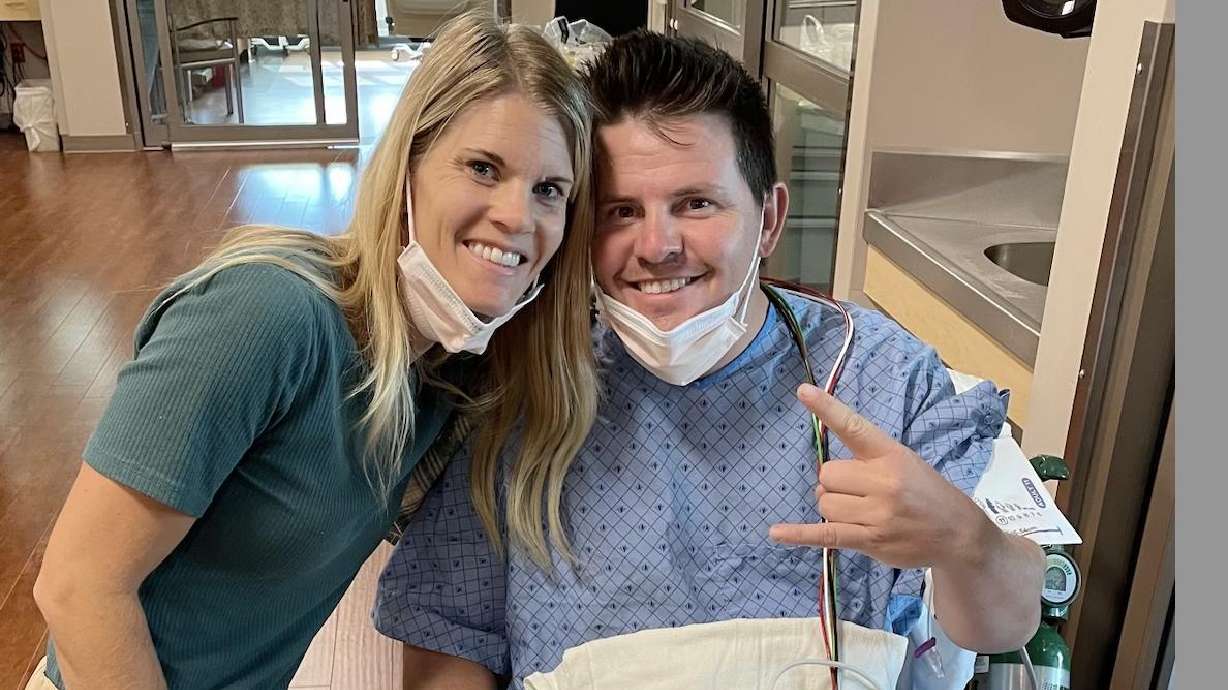ALL NEWS
Accidental disinfectant poisonings in children on the rise during pandemic
Apr 28, 2020, 9:12 AM | Updated: 5:22 pm

FILE: Yuganov Konstantin/Shutterstock
(CNN) — When his daughter was born, Alex Kaplan thought his home was babyproof. He was wrong.
“We have a wily little girl,” said Kaplan, who lives in Washington, D.C. “At 9 months old, she managed to open a childproof — in air quotes — bottle of acetaminophen.”
When Kaplan found her, she was smeared in a sticky mess from putting the gel caps in her mouth. “Acetaminophen, we came to learn, is very dangerous and dose-dependent,” said Kaplan, who called poison control then headed to the closest emergency room.
Kaplan’s daughter was fine, but accidental poisoning is a serious problem for American kids.
More than 300 children are treated for poisoning each day in emergency departments across the United States, according to the US Centers for Disease Control and Prevention.
On average, two of those kids will die.
As Americans spend more time at home trying to safeguard their families against Covid-19, accidental poisonings are on the rise. And some experts believe the spike is due to the very same cleaning products parents are using to protect their families from infection.
Why have poisonings increased?
“Our center has experienced a greater than 100% increase in calls related to disinfecting products from March 31 through this week,” said Dr. Kelly Johnson-Arbor, medical director of the National Capital Poison Center. While President Trump’s comments on fighting Covid-19 with disinfectants have been tied to a surge of poison control calls, the increase predates his April 23 press briefing.
Dr. Johnson-Arbor’s poison center serves counties in Maryland, Virginia and the District of Columbia, but calls are up across the United States.
The Health Resources and Services Administration has found that calls to poison control centers went up 24% from January to March 2020.
“A lot of it is driven by increased use and exposure to cleaning products,” Johnson-Arbor explained, noting that many Americans are taking extra steps to clean and disinfect their homes to prevent the spread of Covid-19.
“These cleaning products are in short supply,” Johnson-Arbor said. “We’re just sort of grabbing whatever is available, and it may be something we’re not familiar with using.”
A study released by the CDC on April 24 reinforced what Johnson-Arbor and her colleagues have observed.
Poison center calls related to cleaning products and disinfectants were up 20.4% in the period from January through March 2020, when compared to the previous year, according to the new data.
Though the study doesn’t break down numbers by month, the CDC’s graphs depicting calls to poison centers showed that the increased exposures really shot up in March, a period of growing awareness about the danger posed by Covid-19.
Children are at highest risk for chemical exposure
Those calls to poison control centers disproportionately involved young children.
“Children are naturally inquisitive,” Johnson-Arbor said. “That’s why it’s not uncommon to see children getting into these cleaning products.”
The most vulnerable group included children who were 5 years old and under. From January to March 2020, they accounted for 35.7% of total poison center calls related to cleaning products, and 46.9% of exposures to disinfectants.
While older kids accounted for fewer calls to poison control, they’re still at risk. During the sample period highlighted in the CDC study, youth ages 6 to 19 accounted for 8.9% of exposures to cleaning products and 13.6% of exposures to disinfectants.
While the numbers have gone up, the overall proportion of children affected is consistent with data from past years.
The National Capital Poison Center reported that in 2018, 44.2% of poison exposures were children who were 5 years old and under.
Of these, 1-year-olds and 2-year-olds were at highest risk. The NCPC report showed that in children 12 and under, boys are most likely to be exposed; girls are at higher risk starting at 13 years old.
Common products can be dangerous to kids
Chemical exposures are on the rise, but even in a normal year, household cleaning products pose a health hazard to kids.
“Any of the currently available products can be hazardous to children,” Johnson-Arbor said. “Disinfectants generally have similar compositions. They’re generally made up of bleaches, ammonium compounds, alcohols, abrasive agents — all of those things are potentially toxic.”
All-natural cleaning products can pose a risk, too, Johnson-Arbor noted.
“Natural cleaning products may not contain the quote-unquote ‘harsh chemicals’ that are present in the traditional products, but they might contain other things,” she said.
“Sometimes natural cleaning products will contain essential oils, for example, and essential oils can be very irritating to the skin, to the eyes and to the gastrointestinal tract.”
Cleaning substances were the No. 2 cause of poisoning for children under the age of 6, accounting for 10.7% of all exposures in 2018, according to data from the annual report of the American Association of Poison Control Centers’ National Poison Data System.
Topping the 2018 list for pediatric exposure were cosmetics and personal care products, which accounted for 12.1% of cases. In the No. 3 spot were analgesics, pain relievers such as acetaminophen, ibuprofen and aspirin.
The most common chemical exposures are not always the most serious, however.
For children under 6 years old, pain medications accounted for 20.5% of poisoning fatalities from 2014 to 2018, reported the National Capital Poison Center, drawing on figures from the American Association of Poison Control Centers’ National Poison Data System. Other top poisoning fatalities included fumes (16.7%), antihistamines (6.4%) and cardiovascular drugs (5.7%).
Despite the prevalence — and recent rise — of pediatric poisonings due to household cleaning and disinfectant products, they’re relatively unlikely to cause fatalities. Between 2014 and 2018 they accounted for just 3.4% of poisoning deaths.
How to avoid household poisonings and chemical exposure
In the CDC study, the highest proportion of calls to poison control centers related to cleaning and disinfectant products were because someone ingested the dangerous substance. Inhaling products came in at No. 2.
“Some of these products look very enticing,” Johnson-Arbor said. “They may be yellow or purple in color, and they might resemble a juice or some other products that a child is used to playing with.”
To prevent kids from getting into potentially dangerous substances, including chemicals and medications, Johnson-Arbor said proper storage is essential.
“We always want to keep these products high and out of reach of young children,” she said. “People should have child-protective locks on any area where they store these compounds.”
But when it comes to protecting children from cleaning products, Johnson-Arbor noted that proper use is important, too.
“These products are meant to be used one at a time,” she said. “If you mix them together, sometimes you can create a byproduct that is actually more toxic and more noxious.” One common and dangerous mistake, Johnson-Arbor said, is combining bleach with ammonia or vinegar.
“If you’re working with chemicals at all, do it in a well-ventilated space,” she said. Especially when cleaning bathrooms, which tend to be poorly ventilated, Johnson-Arbor said it’s good to keep kids well away from the area.
“Young children, especially if they inhale the chemicals, can get a lot of respiratory irritation,” she said. “You don’t want anyone in there who doesn’t need to be there during the cleaning process.”
If your child is exposed to dangerous chemicals
After that scary encounter with acetaminophen, Kaplan decided to step up his home’s child-readiness. He scheduled a visit from Baby Proofing Montgomery, a company that specializes in advising parents on creating safe homes.
Now, his house has enhanced childproofing, with chemicals and medications stored far out of reach. And when Kaplan’s friends become parents, he makes sure they have the number for poison control saved into their cell phones.
“They’re just phenomenal, both in their depth of knowledge, and in their ability to guide you through a potentially dangerous poison situation,” Kaplan said. “When you want to use them, you want to know their number immediately.”
Despite an increased volume of calls, Johnson-Arbor said America’s poison control centers will be available throughout the pandemic and beyond.
“We are open 24 hours a day, every day of the year, including holidays,” she said. In addition to toll-free hotlines, Johnson-Arbor noted that help is available online at Poison.org.
It’s possible, she said, that wait times will be longer than usual. While poison control centers are not government-run, some are operating state Covid-19 hotlines to assist with the pandemic response.
The increased wait times, Johnson-Arbor said, should not deter anyone from calling in. When they do, they’ll reach specially trained nurses and pharmacologists offering free help.
There are 55 poison control centers serving all 50 states, plus overseas territories. Poison control centers are funded by federal, state and city governments, with additional support from individual donations. On April 23, the US Department of Health and Human Services announced it was allocating nearly $5 million in funding to poison control centers.
“We are not a government agency, and we do need to keep our funding levels adequate,” Johnson-Arbor said. For now, though, she said the service will remain available to all Americans.
“We will stay open,” she said.
The-CNN-Wire
™ & © 2020 Cable News Network, Inc., a WarnerMedia Company. All rights reserved.
How To Prevent the Spread of COVID-19Coronavirus
COVID-19 coronaviruses transmitted from person to person. It is a virus that is similar to the common cold and the flu. So, to prevent it from spreading:
- Wash hands frequently and thoroughly, with soap and water, for at least 20 seconds.
- Don’t touch your face.
- Keep children and those with compromised immune systems away from someone who is coughing or sneezing (in this instance, at least six feet)
- If there is an outbreak near you, practice social distancing (stay at home, instead of going to the movies, sports events, or other activities.)
- Get a flu shot.
Local resources
Utah’s Coronavirus Information
The Church of Jesus Christ of Latter-day Saints
Utah Coronavirus Information Line – 1-800-456-7707
National Resources
Centers for Disease Control and Prevention
Commonly asked questions, World Health Organization












